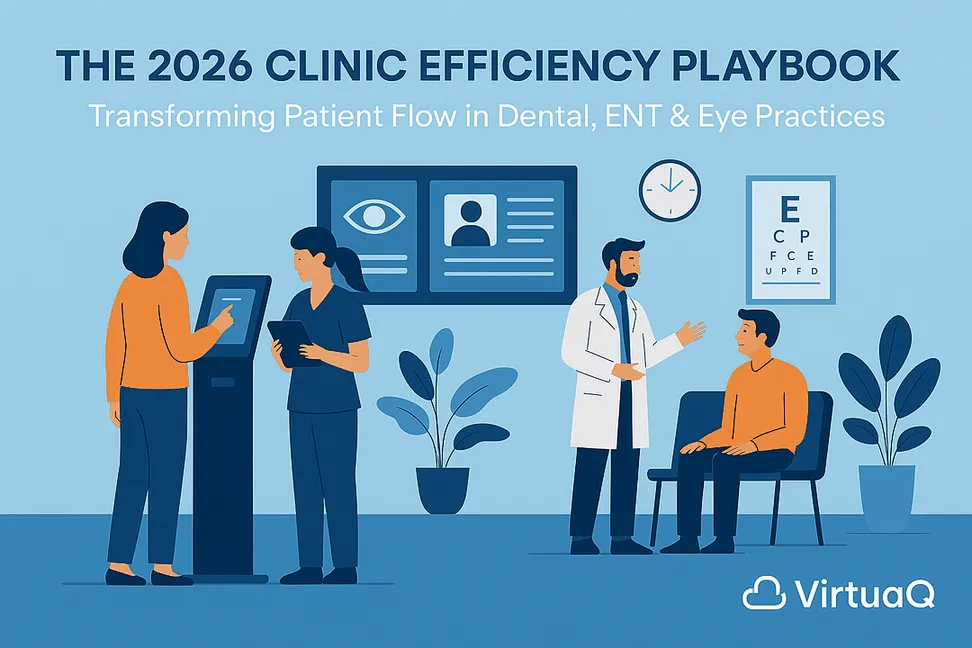The 2026 Shift: Where Patient Experience Begins Before the Chair
In 2026, the patient experience begins long before the treatment chair. Whether it’s a dental clinic juggling back-to-back cleanings, an ENT practice during peak allergy season, or an eye hospital managing heavy walk-in traffic — the waiting room has become the new measure of care quality.
Patients no longer evaluate healthcare solely by medical outcomes. They judge by how fast, seamless, and transparent their journey feels. In a world accustomed to on-demand everything, static queues and manual scheduling are no longer sustainable.
Clinics that continue to operate as they did pre-2024 risk losing patients, staff morale, and operational efficiency to those that have embraced intelligent automation.
The good news? 2026 marks a defining year for digital transformation in specialty clinics — a shift from reactive management to proactive experience design.
Discover how VirtuaQ helps clinics turn waiting rooms into intelligent, connected patient journeys. Book a Free Demo Today
(In the first three parts of this series, Sujay and I explored the broader context — from the emotional toll of long patient waits to their business impact across industries. If you missed them, start with:
The Unspoken Cost of Long Patient Wait Times in Modern Healthcare
Reduce Wait Times in Banks, Hospitals, and Retail: Boost CX, Efficiency & Revenue
The Impact of Patient Wait Times: A Guide to Reducing Delays and Improving Patient Experience
Why Patient Wait Times Still Spiral in Specialty Clinics
While hospitals have long tackled queue inefficiencies, specialty clinics — dental, ENT, and eye care — face a distinct set of challenges that often go unnoticed. These issues silently undermine patient trust, staff efficiency, and the overall care experience.
1. The Overrun Appointment
A lengthy dental procedure, complex ENT consultation, or detailed eye scan can throw off the entire day’s schedule — creating a domino effect of delays.
2. The Scheduling Domino Effect (Overbooking)
Overbooking might seem efficient, but it backfires when even one patient arrives late or a procedure takes longer than planned.
3. Front Desk Bottlenecks
Reception teams handle walk-ins, calls, paperwork, and insurance queries simultaneously. Patients end up queuing just to check in — before care even begins.
4. Failure to Communicate Delays
In 2026, real-time communication is an expectation, not an enhancement. Silence during delays fuels frustration and uncertainty.
5. Late-Arriving Patients
Even a single late arrival can derail tightly packed schedules. Without dynamic queue management, punctual patients are penalized while staff scramble.
From Waiting Rooms to Intelligent Journeys: The 2026 Digital Shift
Traditional fixes — hiring more staff or adjusting appointment windows — can’t solve systemic inefficiencies. The future belongs to clinics that reimagine patient flow itself.
VirtuaQ’s Smart Queue Management Platform replaces static, linear processes with fluid, omnichannel journeys that adapt in real time.
1. Virtual Check-Ins: Eliminating Front Desk Congestion
Problem: Manual check-ins create morning rushes and long queues.
VirtuaQ Solution: Patients check in remotely via mobile before arrival, reducing footfall at the desk. Dental and eye clinics can manage multiple appointments efficiently while freeing staff for meaningful engagement.
2. Real-Time Communication: Meeting 2026 Expectations
Problem: Patients lose patience when uninformed.
VirtuaQ Solution: Automated notifications update patients on wait times or schedule changes instantly — allowing them to wait comfortably elsewhere while staying informed.
3. Staff Dashboards & Alerts: Precision in Motion
Problem: Staff react to queues instead of anticipating them.
VirtuaQ Solution: Live dashboards give visibility across rooms, departments, and staff. Teams can prepare in advance, minimizing idle time and improving turnover between appointments.
4. Mobile Queuing: Flexibility Without Chaos
Problem: Late arrivals disrupt the queue for everyone.
VirtuaQ Solution: Patients can join or adjust their queue remotely. VirtuaQ dynamically reorders visits without penalizing on-time arrivals — keeping flow steady and fair.
Why Clinic Efficiency Will Define 2026
By 2026, operational efficiency will be the most visible differentiator in healthcare. Clinics that modernize patient flow will outperform peers on both satisfaction and profitability.
| VirtuaQ Capability | Clinic Impact |
| Virtual Check-In | Faster intake, less crowding |
| Omnichannel Communication | Patients stay informed and at ease |
| Staff Dashboards & Alerts | Improved prep and resource use |
| Mobile Queuing | Late arrivals managed without disruption |
| Cloud-Native Integration | Works seamlessly with existing systems |
Clinics using VirtuaQ typically achieve:
- 30–40% reduction in average patient wait times
- Higher staff productivity and morale
- Improved patient satisfaction and retention
- Stronger reviews and word-of-mouth referrals
- A calmer, more professional environment
The 2026 Blueprint: Building the Modern Specialty Clinic
This is not about shaving minutes off a stopwatch — it’s about redesigning care delivery for a digital-first world.
Dental, ENT, and eye clinics that embrace smart queue management in 2026 will lead a new era of experience-driven, efficient healthcare.
They will set the benchmark for:
- Predictable, transparent patient journeys
- Empowered, data-enabled staff
- Seamless omnichannel experiences that bridge online and offline care
Ready to future-proof your clinic for 2026
VirtuaQ helps you transform waiting rooms into intelligent, orchestrated patient journeys that improve satisfaction, efficiency, and trust — without adding administrative burden.
Book a Free Demo with VirtuaQ and see how your clinic can be operationally transformed in weeks, not months.
References
Effect of Queue Management System on Patient Satisfaction -
